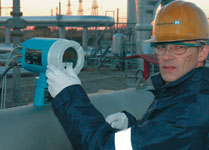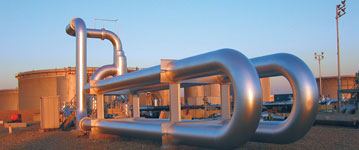
Precise measuring of oil flow is becoming increasingly important due to high oil prices, with even small deviations in accuracy having an impact. Coriolis metering technology is known for its great accuracy and reliability. Oil metering systems based on Coriolis meters feature a compact design because the device does not require straight inlet runs, filters or strainers.
On its way from deep under the ground into a car's tank or a house's oven, crude oil and its refined products are transported in various manners. Crude oil is transported via pipelines or by large ocean going vessels, from its country of origin to places all over the globe. Once it reaches its destination, the crude oil is unloaded in port, and often processed in on-site refineries. European examples include the ports of Marseille, Hamburg, and Rotterdam.
The refined products are usually transported through pipelines or by trains and tank trucks, sometimes also by ship again. During transport, crude oil and oil products usually change owners as well. Regardless of the mode of transportation, there is always a need for accurate information on how much oil has been moved. This is especially true at times when oil prices are high and even small improvements in metering precision translate into large amounts of money.
Metering systems
Modern loading and offloading facilities are largely automated with a metering system monitoring and controlling the hydrocarbon transfer process. The metering systems can be used for varying purposes, distinguishing between fiscal metering (where taxes are to be paid on the amount of oil transported), custody transfer metering (where the oil changes owners) and - especially with pipelines - allocation metering (where product flows from different origins and is joined in one pipeline, or where multiple consumers are supplied through one line).
Metering systems used in the oil industry may be quite diverse in design, from a single flowmeter to a complete system with multiple metering trains, in-line proving facilities, sampling units, BS&W (basic sediment and water) packages, flow computers, and operator stations. However, at the heart of each metering system, there is a flowmeter which registers the oil flow. Traditionally, turbines or PD meters have been used for this purpose, but in recent years, modern metering principles, such as ultrasonic and Coriolis mass meters, have begun to capture this terrain as well. Coriolis meters in particular are now also available for larger diameters up to DN250, and have thus become popular in applications such as loading and unloading of ships.
Coriolis technology
Coriolis flowmeters have been around for more than 20 years and are nowadays preferred in major process industries such as chemical and food and beverage. Their mechanical integrity, reliability, accuracy and stability are key attributes, and they definitely help to improve the production process control. Moreover, due to their metering principle, Coriolis meters are not influenced by the flow profile of the liquid. As a result, no straight inlet runs need to be planned, and flow conditioners have become superfluous. Having no moving parts, Coriolis flowmeters are not subject to wear and tear, and filters or strainers are unnecessary. These qualities render Coriolis meters very attractive for the oil industry as well.
For this reason the American branch organisation API (American Petroleum Institute) has included Coriolis technology in its 'Manual of Petroleum Measurement Standard' of 2002. Chapter 5.6 of this standard ('Measurement of Liquid Hydrocarbons by Coriolis Meters') describes the installation, use, and maintenance of Coriolis meters for applications in oil and oil products. It also stipulates methods for meter proving and validation of Coriolis meters.
Meter proving is a comparison test of a meter's performance. During this test, a liquid flows through the Coriolis meter first, and then passes through a meter prover. Essentially, the meter prover consists of a piece of pipeline with a precisely known volume. Thus it can be used as reference for flow measurement. The comparison of the volume displacement in the meter prover with the measured results from the Coriolis meter determines the device's accuracy.
Measurement accuracy tests
The Endress+Hauser Coriolis meter Promass F has been tested with various oil products following the proving procedures described in the API standard. The tests were conducted by the French SPSE (Société du Pipeline Sud Européen).
SPSE operates a pipeline which supplies crude oil to five refineries in France, Switzerland, and Germany. The institute has a tank farm in Fos-sur-Mer near Marseille with 40 oil reservoir tanks, and an oil flow calibration facility and offers flow performance testing with a 600 mm ball prover. The calibration facility is accredited by the French accreditation office COFRAC (Comité Français d'Accréditation) for the measurement of liquid flow.

The tests of the DN150 and DN250 meters were conducted with four different oil products, namely naphtha, Oural crude, condensate, and fuel oil. These products cover a large range of densities (690.960 kg/m³) and viscosities (0.7.180 cSt).

Custody transfer approval
A custody transfer approval is only granted following a successful, supervised proving procedure. For this certification, flowmeters must comply with the international OIML recommendation R117 ('Measuring systems for liquids other than water'), which sets performance standards of accuracy and repeatability for the meter. Product certification for the highest level of accuracy requires the Coriolis meter to have a maximum deviation of ±0,2% with a repeatability of no more than 0,12% over the total range of measurements. Under supervision of the Dutch metrology institute NMI, Promass performed very well in every test, with maximum deviations from the prover between -0,11% and +0,07% and with the repeatability below 0,05%. These values are well within the thresholds required by OIML R117.
Accordingly, Promass received the custody transfer approval for measurement facilities, and can therefore be used for fiscal and custody transfer measurements of oil flows.
Great versatility
By now, Coriolis flowmeters have proven their accuracy and precision in numerous extensive tests with many different oil products. Since Coriolis meters with compact dimensions are available and straight inlet runs are not required, the metering systems can be built space efficiently. Moreover, the instrument not only measures the mass flow, but also the density of the oil. Through digital communication protocols such as Modbus, this data can be sent to a flow computer which calculates relevant values, such as gross and net volume and reference density at 15°C online, in accordance with the API 2540 calculation guidelines. With meters up to DN250 this technology represents an interesting modern alternative to conventional metering principles in cargo transport applications.
For more information contact Romeo Rocchetti, Endress+Hauser, +27 (0)11 262 8000, [email protected], www.endress.com
| Tel: | +27 11 262 8000 |
| Email: | [email protected] |
| www: | www.endress.com |
| Articles: | More information and articles about Endress+Hauser South Africa |

© Technews Publishing (Pty) Ltd | All Rights Reserved